From a bunch of exciting new AI tools to absolute game-changers like Content changes and Report Builder, to taking our Site Audit tool to the next level, we’ll go through it all in this post.
Plus, we’re not just reflecting on the past today – we’re also taking a glimpse into what’s coming soon to Ahrefs in 2025.
Let’s go!
(Short on time? Check out our changelog instead for a succinct list of new features.)
Our AI tools are designed to boost your productivity and save you time by automating keyword research, content optimization, and technical SEO tasks.
AI Content Helper
AI Content Helper is a more natural content optimization tool that focuses on comprehensive topical coverage rather than keyword stuffing.
Instead of counting the number of keywords to include in your article, our Content Helper uses AI to identify the core topics for your target keyword. It then scores your content, along with your competitors’, against those topics in real-time as you write the article.
You can also use AI features to brainstorm title tags, meta descriptions, and headings – and pretty soon, get internal linking suggestions to boost your content authority.

AI Content Helper is free while in beta, so take it for a spin and let us know how we can improve it!
Learn more about AI Content Helper →
AI translations
Translating keywords for regional markets for international SEO is not an easy process. You need to:
- Compile a keyword list with SEO metrics
- Hire experienced translators
- Transcreate keywords
- Create a content plan based on the transcreated keywords
Ahrefs’ AI translator can do all these at once, saving you time – and translator fees! – to scale your content strategy globally.
Start from a saved keyword list, choose from 40+ preferred languages and dialects followed by the keyword location, and hit “Translate”.

What sets it apart from other translation management tools is that you’ll get translated alternatives of each keyword, so you can choose the version with the highest keyword search volume (like the translation of the “popcorn” across various Latin-American countries).

AI Content Grader
Similarly to AI Content Helper, AI Content Grader automatically analyzes the top-ranking pages for an existing article and keyword and scores it against its competitors.
It then paints a clear picture of the exact areas that require content improvements.
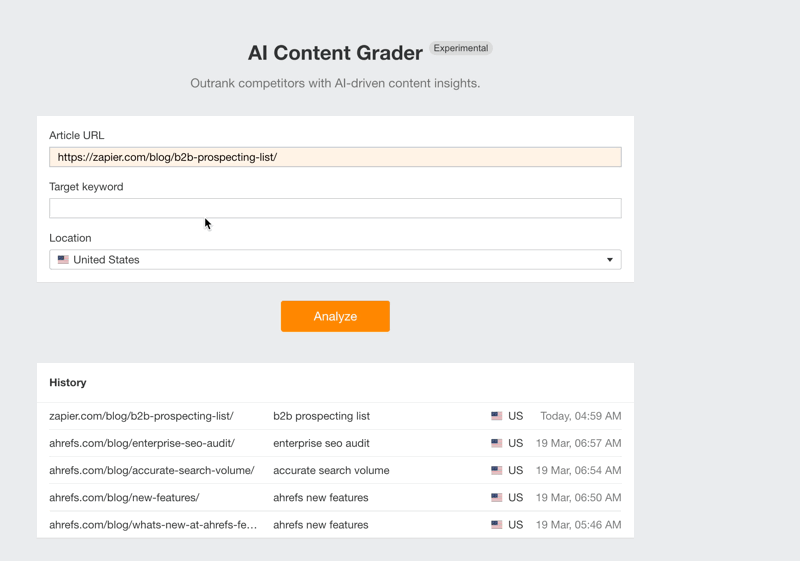
AI Content Grader also shows you suggestions on how to best cover subtopics, word-for-word, by providing a real-life example from a top-ranking page.

AI Search intent
Search intent – the reason behind a search query – can sometimes be obvious (transactional in this case).

When it comes to queries with multiple intents or unclear ones, our AI can help to analyze the different types of search intents and show what content angles to tackle next.
We also break down the percentage of total traffic that goes to each one of them – something no other SEO tool can do at the moment. Use them as hints as to what content angles you can use to rank.

Learn more about AI Search Intent →
Content changes
What’s one of the hardest SEO problems to crack? Finding out what causes a change in organic traffic.
Now, you can easily monitor one of the most hidden ones, page-level content changes, across various reports.
Site Explorer > Overview performance chart
Just turn on Content changes from the three ellipses.

Hover over these green bubbles to see the extent of content changes made on a page (moderate/major/overhaul) and their influence on traffic numbers. Hit View changes to open the Page Inspect tool and compare the content changes side-by-side to see exactly what changed.

Site Explorer > Top pages
You can also go broad and analyze top-performing pages via the Top Pages report across two different dates. Check whether content changes have impacted the traffic changes under the Traffic changes column.

Learn more about Content changes →
Keyword search intents
Get ready to level up your keyword game – with the Search Intents column, you’ll instantly uncover what searchers are really looking for. See common search intents for keywords like: commercial, transactional, informational, and so on.
We also break it down and show if keywords are:
- Branded: When searchers have a specific brand in mind.
- Local: When they’re looking for nearby services or locations.
You’ll find keyword intents in Site Explorer and Keywords Explorer reports, Rank Tracker Overview 2.0, and Site Explorer Overview widgets.

Learn more about keyword search intents →
SOV + SOTV in Overview
Want to measure your brand’s popularity and visibility across organic search?
The share of voice (SOV) metric shows the percentage of traffic that your target website gets, compared to the traffic of other websites. Just add multiple competitors – up to 10! – in the Performance chart on Site Explorer > Overview.

We’ve also added a Share of Traffic Value (SoTV) metric. This sums up the Traffic value of the target (the estimated cost of traffic it were to be paid for via PPC ads) and the specified competitors, then shows what percentage share the target and its competitors occupy.

Calculating the ROI of content is a hard task in itself. That’s why you can use this metric as a proxy to see how valuable your content is compared to existing organic competitors in the market landscape.
Paid search tab
The Paid search tab in Site Explorer Overview gives you insights into your target’s:
- Top ads, along with the exact ad copy and key metrics
- Top paid keywords
- Top paid pages
Use these to get a great overview of the exact keywords your competitors are bidding on and which keywords are sending them the most paid traffic, plus their best-performing paid pages.

Linking authors
Targeted link building just got more streamlined with the Linking authors report. Use this to see a list of authors who commonly link to your competitors, find journalists who commonly publish within your industry, and so on.
You’ll see useful stats for each linking author like:
- Top DR, which tells you the highest DR out of all referring domains
- No. of referring pages
- Total estimated traffic from that author
- No. of links

Growth metric
Need to find trending keywords that are hot in your industry over the last few months? Use the Growth metric.
The Growth metric in Keywords Explorer shows keywords’ search volume growth rate over 3, 6, or 12 months.

Or, filter for keywords that had a specific growth rate over a time period and sort results by growth.
AI Overviews in SERP overview
In the SERP overview in Site Explorer, Competitive Analysis, Keywords Explorer, and Rank Tracker, we now show SERPs with AI Overviews. Just expand it to see all the links and URLs inside.
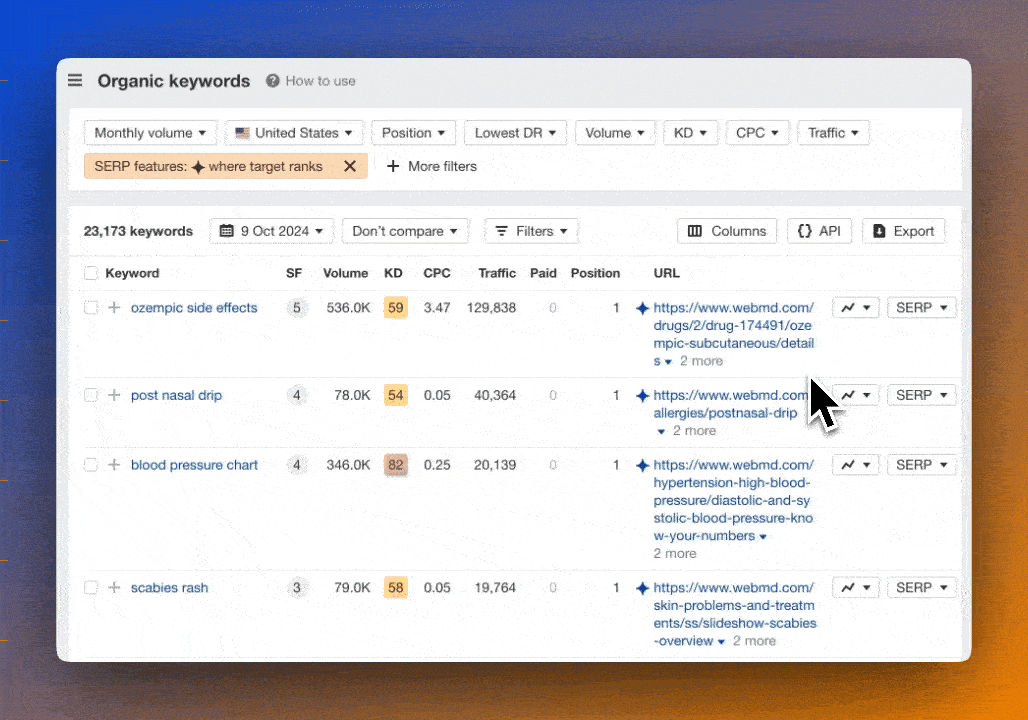
Filter presets for use cases
Want to apply multiple filters for common use cases?
Just use these filter presets. For example, to see trending keyword ideas for the seed keyword “iphone 16”, just select Presets and hit “Trending”.
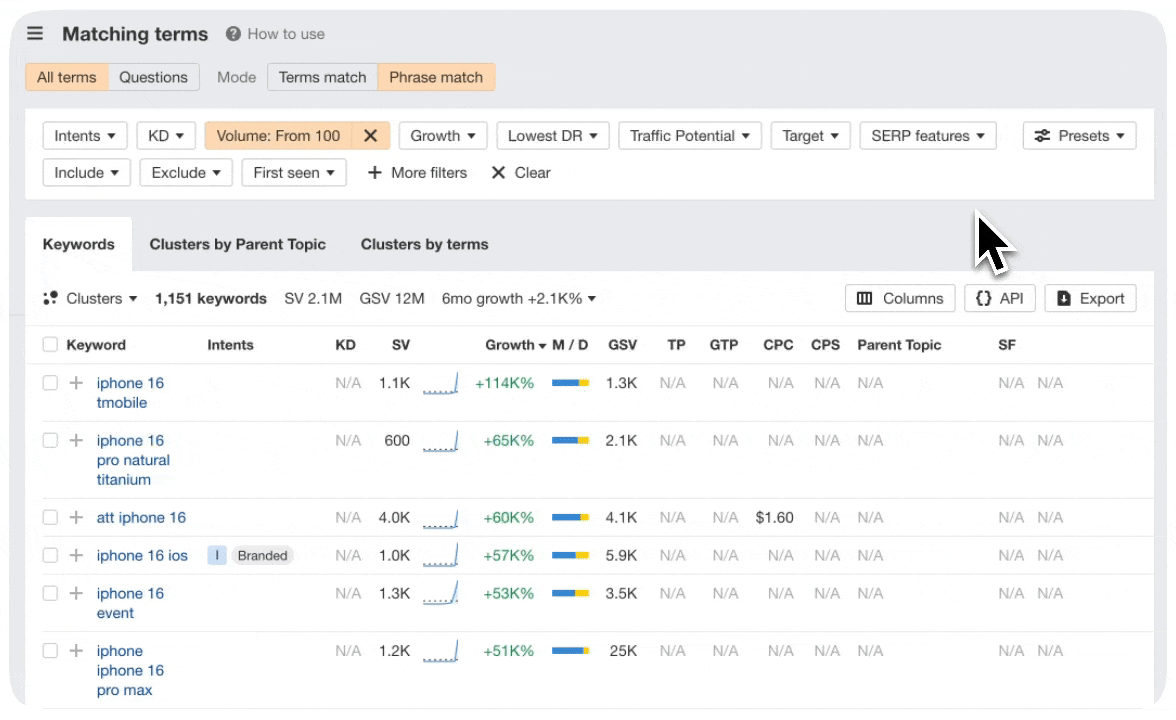
We have big plans for Site Audit in 2025 – we’re set to become the world’s first fully automated site audit tool, and these are the features we’ve rolled out (and a peek at what we’re working on!) to take us there.
Autosubmit to Indexnow
IndexNow is an open-source protocol that lets web publishers inform participating search engines when changes are made to a website, for faster indexing of content changes.
Just enable Auto-submit to IndexNow in your Project settings, and Site Audit will automatically submit your site’s content changes to IndexNow during crawling. So, no need to submit changes manually anymore!

Available with: “Pro” project boost.
Patches
Patches are fixes for your website that you can create and make directly in Site Audit issue reports.
So if Site Audit reported an issue with titles or meta descriptions on your site, you just need to click on “Patch it”, enter new values, and hit publish to fix them at once – no developers needed.
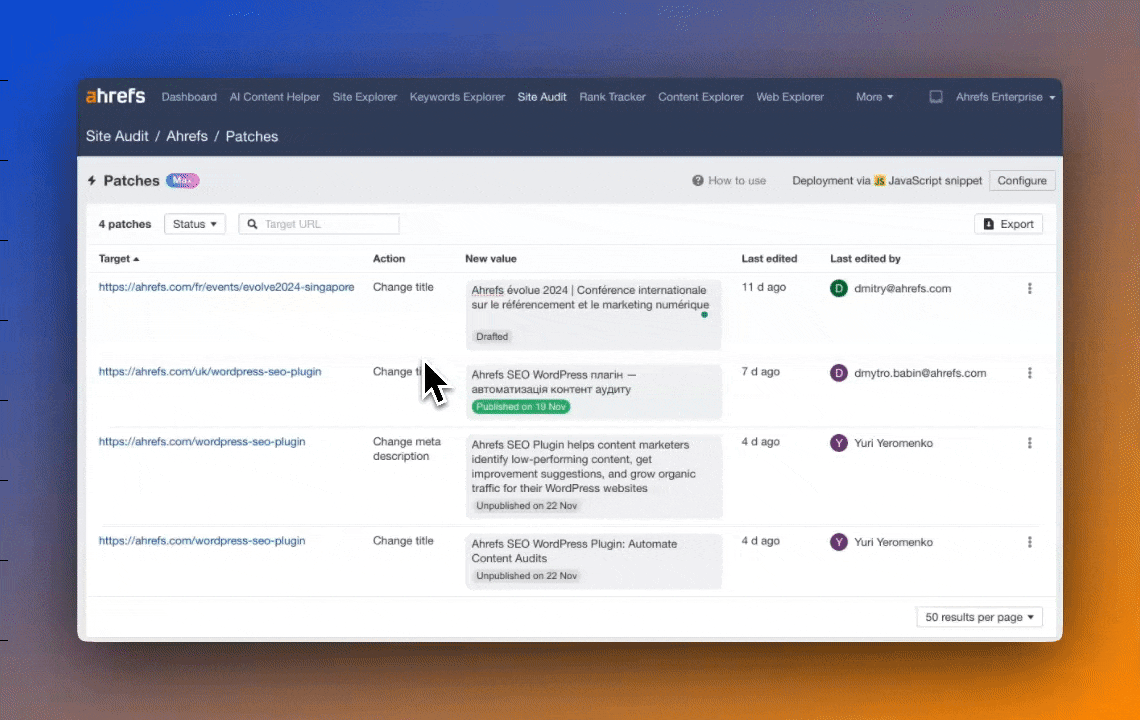
Available with: “Max” project boost.
Always-on audit (coming soon!)
Always-on audit is a new state for crawling your website in Site Audit.
It’s designed to act as a real-time alerts system, a “safety net” for critical issues that might otherwise go unnoticed.
In short, it constantly crawls your website to catch and report technical SEO issues for your most important pages as quickly as possible – unlike traditional crawlers which report them on a weekly or monthly basis.

We’re aiming to roll out Always-on audit by early next year.
Learn more about Always-on audit →
Rank Tracker 2.0 is up and running – here’s why it’s so much better!
Complete revamp
Rank Tracker’s been added to the Dashboard. It’s been revamped and is now heaps faster, with new features:
- View only projects with keywords
- Use folders
- Use the “Starred” feature

No rank filter
Easily find the keywords that your target isn’t currently ranking for with this new filter from Overview 2.0.

Historical charts
Use this date picker to view historical SERPs in SERP overviews – you can also export them.

Plus, track SERP features history for individual keywords in the Overview, Ranking history, and Competitors Overview reports.
Just hover over the chart to see details and track any Ahrefs and Google updates.
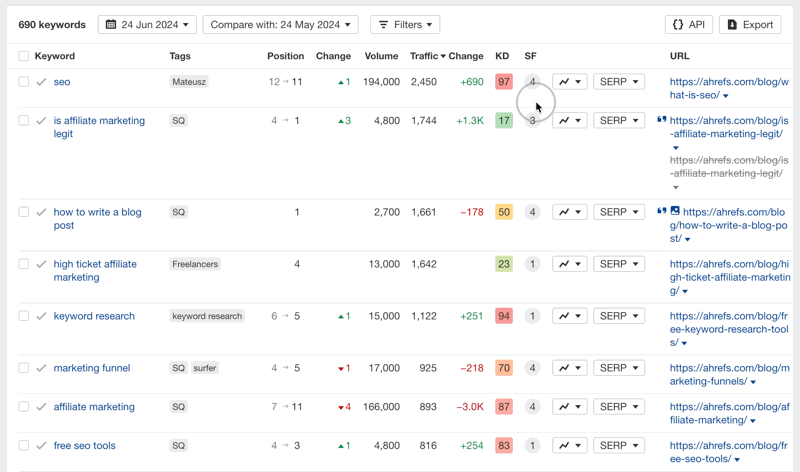
YoY chart in GSC overview
In the GSC Overview chart, you’ll also see Google updates, content changes, and an x-axis with years.
This makes it easy to cross-reference what could be affecting your impressions and traffic numbers.

Report builder
Create your own custom reports using widgets from Ahrefs’ Site Explorer and Rank Tracker data to keep your team and clients in the loop about your SEO wins and progress.
To add your first report, just go to Reports from your Dashboard and click on Create report, then hit Add Widgets and add the data you’d like.

With so many widgets to choose from, here’s a bunch of reports you can start with:
- Monthly SEO report
- Monthly competitor analysis report
- Dashboard for brand monitoring
- Monthly regional rankings report
Learn more about Report Builder →
Batch Analysis 2.0
In the first version of Batch Analysis, you could only analyze up to 200 targets.
But now you can run a search for up to 1000 targets at once – Batch Analysis 2.0 will generate a report with important SEO metrics like Domain Rating, organic keywords and traffic, traffic value estimates, and more, and two new ones:
- The top location that brings the most organic traffic to a target
- The traffic from the top location

APIv3
New endpoints and features
We’re always hard at work expanding our APIv3 offering for Enterprise users. Some of our new additions in 2024 include:
- Outgoing links endpoints
- New features in Keywords Explorer Overview endpoint: target filter, empty keywords parameter, mobile and
- desktop distribution, and monthly volumes.
- Rank Tracker endpoint for Overview 2.0
- Site Audit endpoint for Health Scores
- New Batch Analysis endpoint and two new metrics: the top location that brings the most organic traffic to a target, and the traffic from the top location
As always, you can use the API button in the reports to create request URLs for filters you’ve applied.

We already mentioned that Always-on Audit is coming soon to Site Audit in 2025, and we’re all set for Site Audit to become the world’s first fully automated site audit tool.
Here are a couple more sneak peeks of what we’re excited about:
Web Analytics
A better way to track website traffic: focused insights, GDPR-friendly, cookie-free, and lightning-fast.
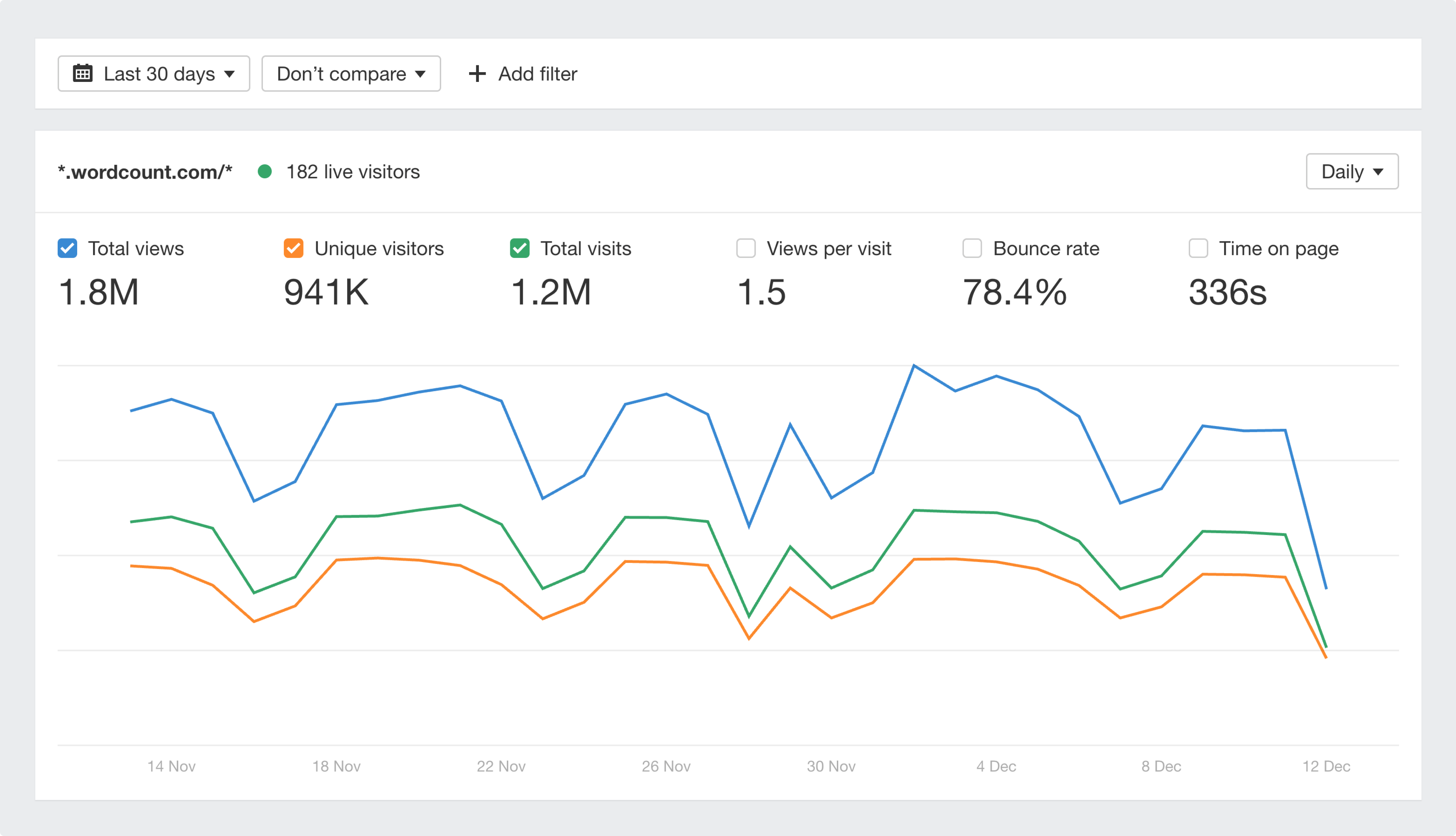
Learn more about Web Analytics →
Chatbot Explorer
Get insight into brand visibility in major LLMs and discover what chatbots say about brands – both yours and your competitor’s.
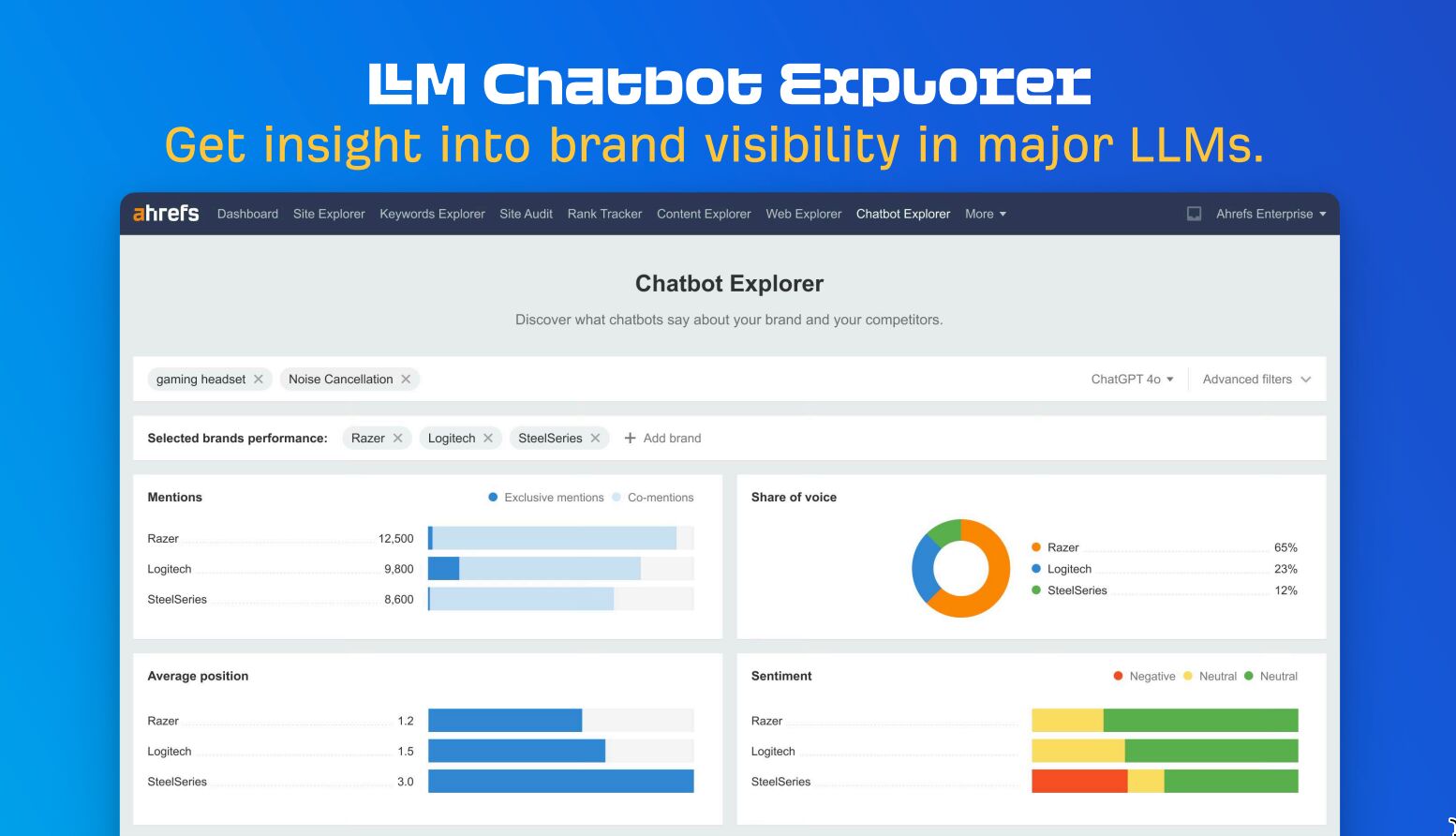
Bot or Not
Identify AI content easily – enough said.
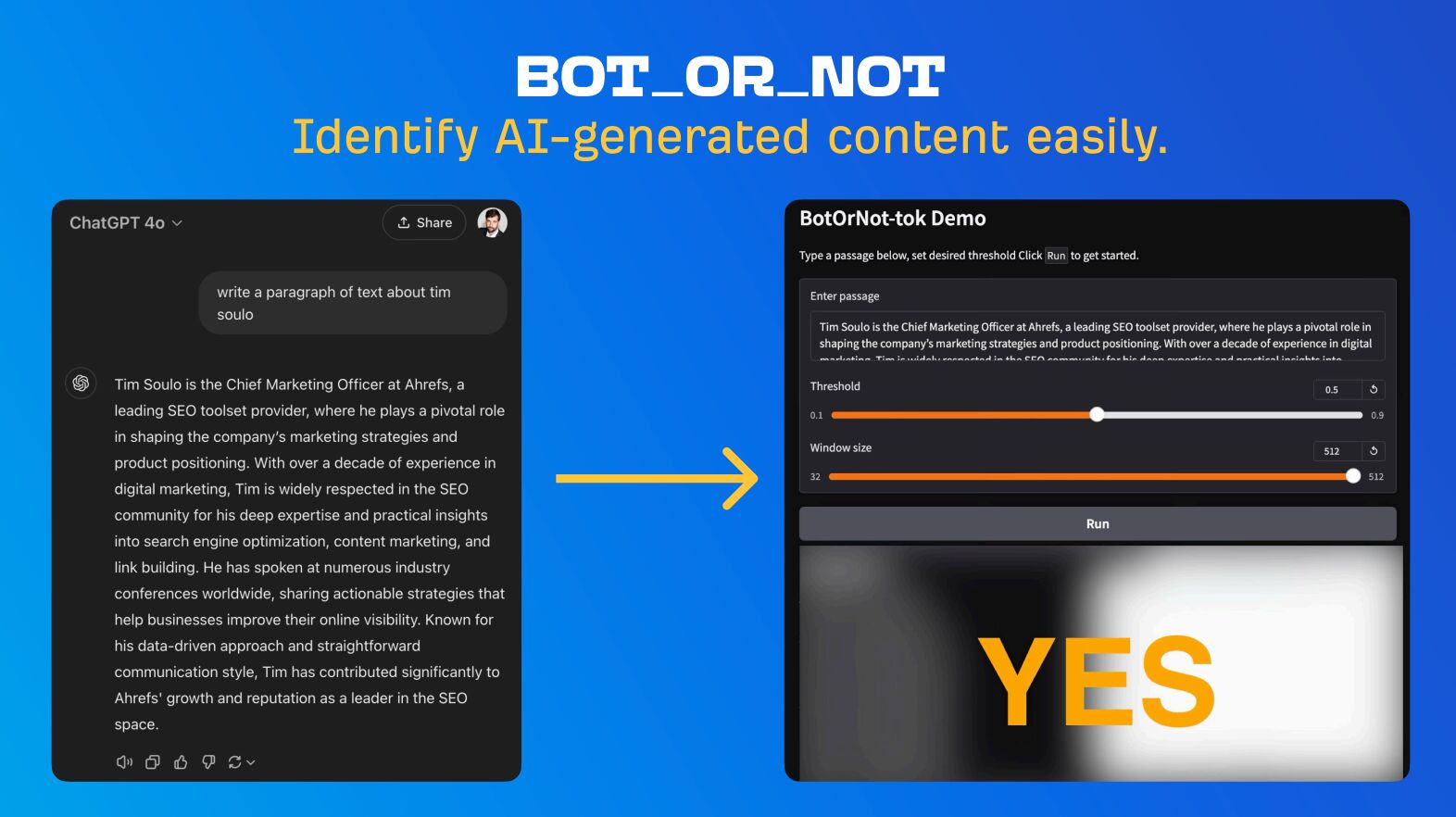
How will we be applying these new features in Ahrefs?
You’ll see 😉
-
That’s a wrap for our 2024 feature highlights. Go try out anything exciting you might have missed and let us know what your favourites are!
2025 is already shaping up to be even better, and we can’t wait to share what’s coming next.
Thanks for being part of the Ahrefs journey – here’s to an even more exciting year ahead.


